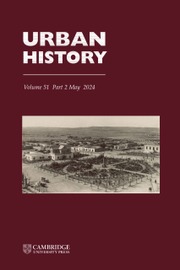Article contents
Reclaiming ‘antique’ data: Charles Booth's poverty survey
Published online by Cambridge University Press: 09 February 2009
Extract
The place of Charles Booth's London poverty survey within an empirical tradition of sociology has been much discussed in recent years. The pivotal position which Booth had in this tradition was highlighted by Philip Abrams especially. Booth's achievement, it has been claimed, was to illuminate the structural underpinnings of poverty rather than just its extent. In doing so he not only challenged the assumptions of political economy but brought new life to the tradition of house-to-house surveys and case-studies as practised by those involved in the statistical movement of the nineteenth century in Britain. Booth sought answers to narrowly denned social problems, seeking to generate new and superior data capable of bearing the questions. His was the habit of ‘ad hoc compartmentalised research’, from which one main line of development was the government enquiries of the Webb era and beyond. Another line of descent can be traced in the social survey movement centred in the United States, and through this Booth's influence spread to the Chicago school of urban sociologists. Despite this wideranging influence those who followed Booth's lead studied his own descriptions of his findings and methods, and rarely, if ever, looked behind the published volumes to the varied materials generated by the large-scale research project he masterminded. These materials represent a rich and varied source of data which have so far been relatively little used by historians, and then mainly in a minor illustrative way.
- Type
- Research Article
- Information
- Copyright
- Copyright © Cambridge University Press 1986
References
The earliest full evaluation of the survey was in T. S., and Simey, M. B., Charles Booth: Social Scientist (1960), esp. chs. 9–12. For Booth's place in the empirical tradition,Google Scholar see Abrams, P., The Origins of British Sociology 1834–1914 (1968);Google Scholar Easthope, G., A History of Social Research Methods (1974);Google Scholar Gordon, Michael, ‘The social survey movement in the United States’, Social Problems, xxi (1973), 284–98;CrossRefGoogle Scholar Jones, D. C., ‘Evolution of the social survey in England since Booth’, American Journal of Sociology XLVI (1941), 818–25;CrossRefGoogle Scholar Cullen, M. J., ‘Charles Booth's poverty survey: some new approaches’, in Smouth, T. C. (ed.), The Search for Wealth and Stability (1979), 155–74CrossRefGoogle Scholar and W. K., Davies, D., ‘Charles Booth and the measurement of social character’, Area, x (1978), 290–6.Google Scholar Both Cullen and Davies have re-examined Booth's published indices with the use of modern statistical methods. The strongest criticism of the significance of the survey in the context of a critique of the empirical tradition generally is that by K. Williams in From Pauperism to Poverty (1981). Those who have discussed or criticized Booth's methodology, including his classificatory system, include Brown, J. in ‘Charles Booth and Labour Colonies’, Economic History Rev., xxi, 2 (1968), 349–59;Google Scholar Hennock, E. P., ‘Poverty and social theory in England: the experience of the 1880s’, Social History, i, 1 (1976), 67–92;CrossRefGoogle Scholar Lummis, T., ‘Charles Booth: moralist or social scientist’, English Historical Rev., xxiv, 1 (1971);Google Scholar C. Marsh, in The Survey Method (1982); McKibbon, R. I., ‘Social class and social observation in Edwardian England’, Trans. Royal Historical Soc, xxvm (1978), esp. 175–6CrossRefGoogle Scholar and Williams, op. cit. For the work on the SBVs, see Kevin Bales, London J. (forthcoming). Another tradition of Booth study is that concerned with his ecological approach to the city, as for example, H. W. Pfautz, Charles Booth on the City: physical patterns and social structure (1967), Davies, op. cit., and W. E. Marsden, ‘Ecology and nineteenth century urban education’, History of Education Quart, (spring 1983) and his article on the education survey, forthcoming in the London J. The London Topographical Society has reprinted Booth's poverty map: The Descriptive Map of London Poverty 1889, with an introduction by David Reeder (1984, no. 130).
- 1
- Cited by




